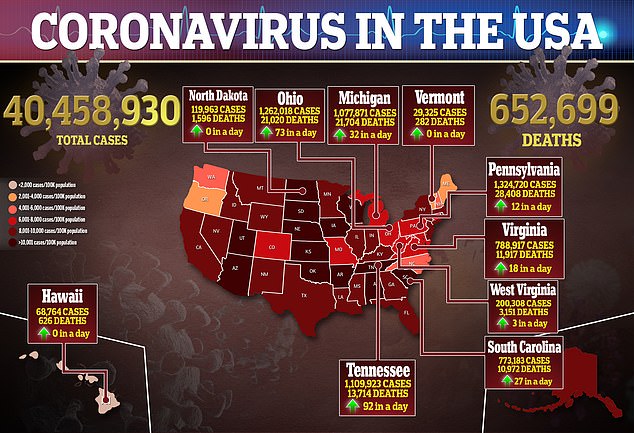Employees working from home full-time become more isolated from their co-workers and have less communication and collaboration, a new study suggests.
Researchers from the University of California – Berkeley Haas School of Business looked at tens of thousands of Microsoft staff members who went from working in headquarters in Redmond, Washington, to being fully remote.
They found that the employees spent less time collaborating, had fewer real-time conversations and decreased the number of hours spent in meetings.
The team says that the findings suggest having all employees work from home full-time makes it harder to share new information, which could lead to loss of productivity.

A new study looked at 61,000 Microsoft employees who were sent home to work remotely full-time due to the COVID-19 pandemic (file image)

Remote workers spent 25% less time collaborating with colleagues across all networks in comparison with the time spent pre-pandemic (above)
‘Measuring the causal effects of remote work has historically been difficult, because only certain types of workers were allowed to work away from the office,’ said co-author Dr David Holtz, a faculty affiliate at the Berkeley Institute for Data Science, in a statement.
‘That changed during the pandemic, when almost everyone who could work from home was required to do so.
‘The work-from-home mandate created a unique opportunity to identify the effects of company-wide remote work on how information workers communicate and collaborate.’
When the COVID-19 pandemic first struck the U.S. in March 2020, hundreds of thousands of companies sent their employees home to work remotely full-time.
Many employers have been delaying returning workers to the office five days a week due to the spread of the Delta variant.
In fact, Microsoft announced on Thursday that it is indefinitely postponed the return to its offices in the U.S.
Working from home does come with many perks such as cutting down on food and travel expenses, spending less time commuting and having more schedule flexibility.
However, large-scale remote work does have an effect on workers’ well-beings.
One study found that 67 percent of people working from home acknowledged feeling loneliness, which can lead to depression, difficulty falling asleep, anxiety and even suicidal tendencies.
In addition, the 2020 State of Remote Work report found that remote employees struggled with loneliness linked to problems with collaboration and communication.
The new study, published in the journal Nature Human Behaviour, shows just how much communication and collaboration suffer when everyone works remotely.
The team looked at anonymized data of more than 61,000 Microsoft employees before and after a company-wide work-from-home mandate was implemented due to COVID-19.

Fewer real-time in-person conversations were had and more time was spent communicating via email and instant messages
Researchers looked at the number of hours spent in meetings, of emails and instant messages sent, of phone calls made and of working hours prior to and during the pandemic.
They found that remote workers spend 25 percent less time collaborating with colleagues across all networks, not just the inner network, in comparison with the time spent pre-pandemic.
Additionally, employees spent more time communicating via email and instant messaging and less time in-person or by video chat.
Lastly, working at home full time led to the number of hours spent in meetings to decrease by about five percent.
Holtz, who conducted the study as an MIT Sloan doctoral intern at Microsoft, said the findings also indicate that a person’s collaboration can be affected not just by he or she working remotely but by colleagues working remotely as well.
‘The fact that your colleagues’ remote work status affects your own work habits has major implications for companies that are considering hybrid or mixed-mode work policies,’ he said.
‘It’s important to be thoughtful about how these policies are implemented.’

Source link : https://www.dailymail.co.uk/health/article-9973963/Fully-remote-workers-spend-25-time-collaborating-fewer-real-time-conversations.html











